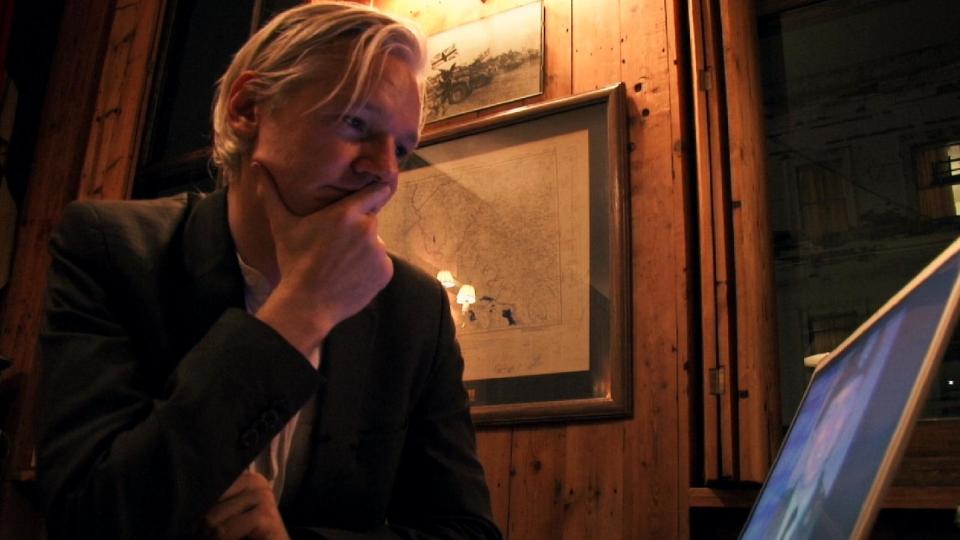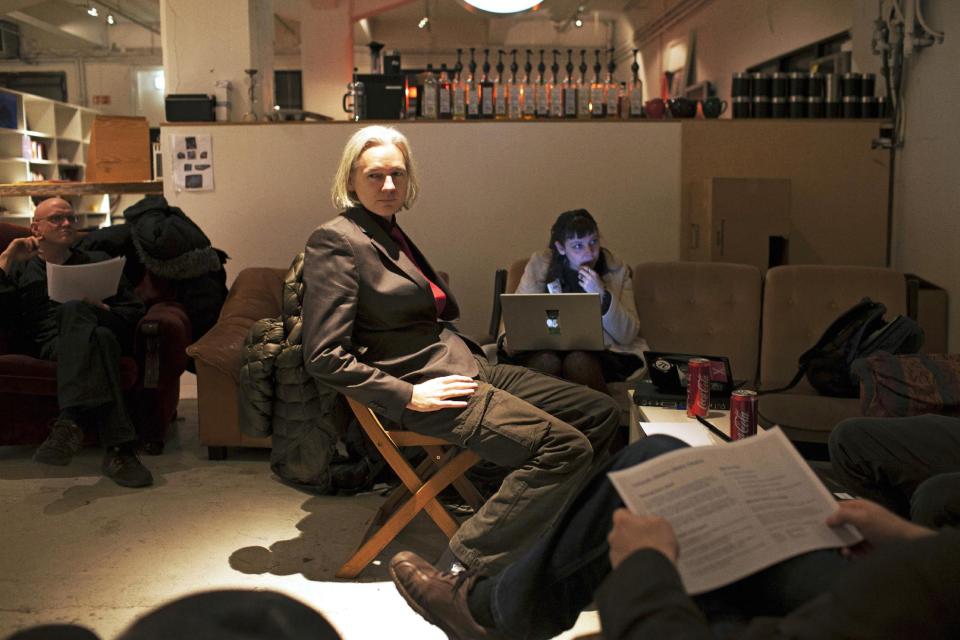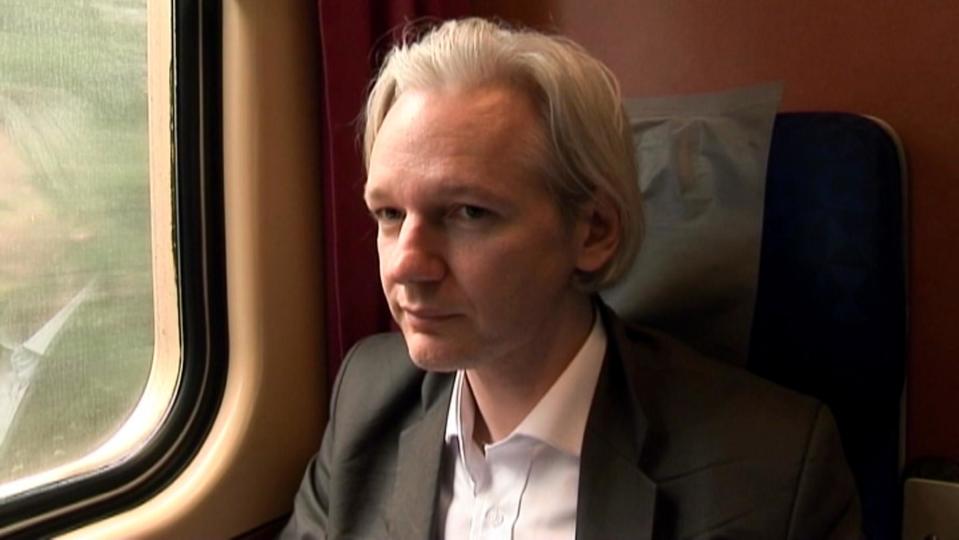Bradley Manning sympathetic star of WikiLeaks doc
LOS ANGELES (AP) — Julian Assange's reign as the star of the WikiLeaks story could be coming to an end.
The charismatic and enigmatic WikiLeaks leader — who remains holed up in the Ecuadorean Embassy in London to avoid extradition to Sweden for a sexual misconduct investigation — became the face of the freedom-of-information movement in 2010 when his website published hundreds of thousands of classified U.S. Army and State Department documents.
But it was Army Pfc. Bradley Manning who provided those documents, and the 25-year-old emerges as the sympathetic star of the new documentary, "We Steal Secrets: The Story of WikiLeaks," which opens Friday — just weeks before Manning's trial for those security breaches is set to begin on June 3.
"I hope that people see this film and have the kind of sympathy for Bradley Manning that I have," said director Alex Gibney. "I think he's gotten a really rotten deal. He's been treated extremely unfairly. And I don't think that's widely known."
Gibney himself didn't really know about Manning when he first began working on the WikiLeaks documentary at the behest of producer Marc Shmuger. It was 2011, and Assange was a worldwide star who declined the director's invitations to be interviewed on camera. Gibney went looking elsewhere and found a bounty of published online chats between Manning and the man who would ultimately turn him in, Adrian Lamo.
"We all hear about WikiLeaks, but WikiLeaks was a publisher, they weren't the source. They weren't the leaker," Gibney said. "The leaker was Bradley Manning. And nobody was really paying attention to Bradley Manning ... and nobody really knew that much about him."
Gibney didn't have access to the soldier, who was tightly confined to the Marine Corps Brig in Quantico, Va., but he did have the texts that had recently been made public. Included in the mater were messages in which Manning, then anonymous, revealed his personal confusion over his gender identity and his professional confusion over how to handle documentation of military behavior he found deeply troubling.
Manning reveals himself in the film through his typed words on screen.
"Once we had the courage to think that we could create a whole relationship out of text, it changed the film," Gibney said. "Because it made (Manning) a central character. Suddenly he wasn't a character who would just be referred to. Suddenly we were intimate with him; we were just intimate with him in a very different way, and it was through print, through his texts. So he's at the heart of the film."
What intrigued Gibney about the intelligence analyst's correspondence with Lamo, who Manning met in an online chat room, was how it revealed "the human element" of the unprecedented leak of classified materials. Manning was alone and he needed someone to talk to about it.
"The hard irony is that he reaches out for human connection with somebody at a moment when he needs to be recognized for every facet of his personality — and I think he also did reach out to Adrian Lamo partially because he was bisexual — and that person ends up being the one who turned him in," Gibney said. "And after all, this is a story about a leaking machine that's supposed to keep everyone anonymous, but it turns out it's not that simple. It turns out that leaking ends up being a human relationship, and so in that context you have to know about Bradley Manning. You have to know about who he is and why he was troubled and what he was going through."
Earlier this year, after the film was finished, Manning released a 10,000-word statement as part of his defense.
Nathan Fuller, a spokesman for the Bradley Manning Support Network, said he wishes some of that content could have been included in the film.
"For people who hardly know his name or just know it associated with WikiLeaks, this (documentary) does give a little more background, but again, that's the audience that needs to hear his political convictions," Fuller said after seeing an early screening. "Far fewer people have heard Bradley's own words in February explaining his decisions, his work in the Army and how becoming an intelligence analyst made him complicit in some of these abuses he was investigating and he didn't want to be a part of it anymore. That's an essential part of the story."
In his statement, Manning detailed how he discovered military abuses, including video footage of the killings of unarmed civilians (including two Reuters journalists) in Baghdad, and was conflicted about where his national responsibility lied.
"I believed that if the general public, especially the American public, had access to the information contained within the (documents) it could spark a domestic debate on the role of the military and our foreign policy in general as it related to Iraq and Afghanistan," he said. "I also believed the detailed analysis of the data over a long period of time by different sectors of society might cause society to reevaluate the need or even the desire to engage in counterterrorism and counterinsurgency operations that ignore the complex dynamics of the people living in the affected environment every day."
"We Steal Secrets: The Story of WikiLeaks" ends before Manning made his public statement, with both he and Assange silenced by their confinements.
Though Assange has sometimes been hailed as a hero, Shmuger, the producer who originated the film, said Manning's story is "the most heartfelt of the human stories" of WikiLeaks.
"I think (the film) really just helps humanize Bradley and I hope that will have an impact," he said. "In many circles, Bradley Manning is a hero. In many other circles, he's clearly not. He was a young man barely out of adolescence when this started who both undertook some incredibly brave actions and some incredibly naive actions, and I think he's guilty of both, but I also think there is a clear and strong morality to the choices that Bradley made and I think it came from a place of doing what he thought was right."
U.S. military representatives did not respond to requests for comment about the film or concerns it could impact the Manning case.
___
AP Entertainment Writer Sandy Cohen is on Twitter: www.twitter.com/APSandy .





